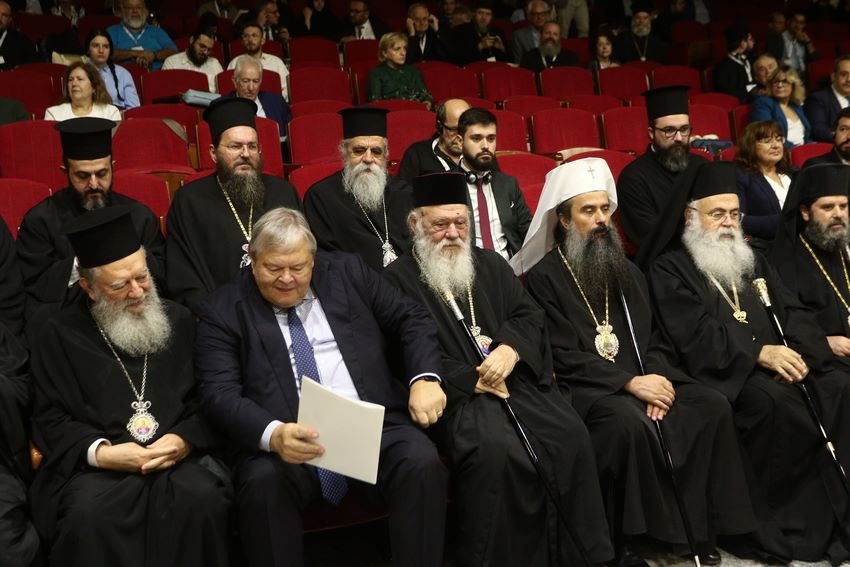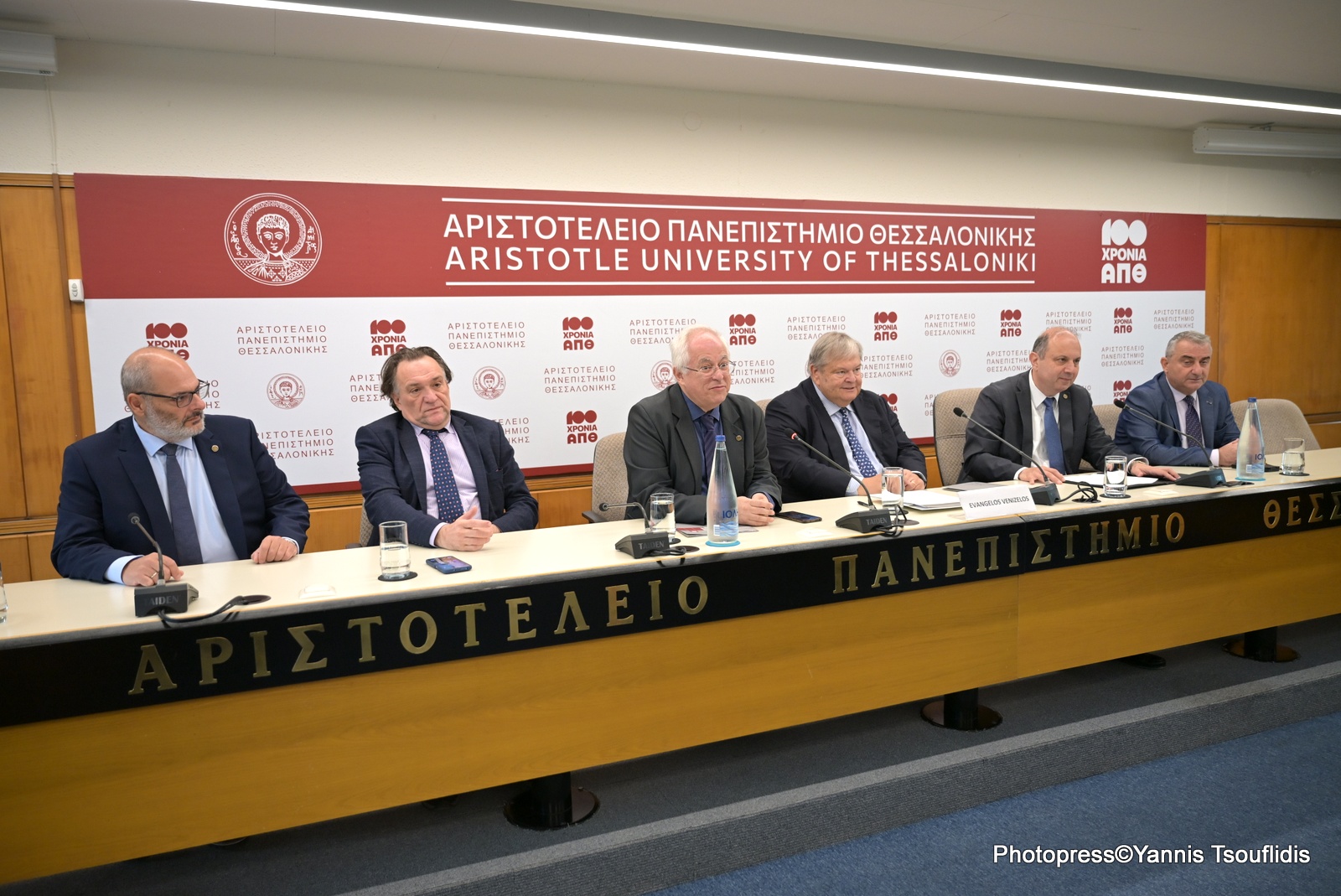
Thessaloniki, September 30, 2025
Evangelos Venizelos, Professor Emeritus of Constitutional Law at the Aristotle University of Thessaloniki, has served as Vice President of the Greek Government, and as Minister of Finance and Foreign Affairs. The following speech of his is from the 2nd International Scientific Conference of the journal Theologia, organized by the Holy Synod of the Church of Greece, on the theme “Orthodox Theology and the Ontology of Technology.”
Technology as a democratic challenge
I have been asked to sketch, briefly, the political-theoretical dimension of our theme. I will speak, therefore, about technology as a democratic challenge, as my colleague Ms. Kefalea has already announced. But I must begin with the clarity of terms; without that, we cannot arrive at the requisite “wisdom.”
Avoiding platitudes, I shall use “technology” to mean “new technologies”: chiefly information and communications technologies, of course artificial intelligence and machine learning, together with the internet and its advanced iterations—now the Internet of Things, augmented reality, and the cluster of developments that compose what we used to call the Fourth Industrial Revolution. In other words, a new epistemological paradigm has taken shape. Within this rubric of new technologies I also include biotechnology in its entirety. It is no accident that the most recent Nobel Prize in Chemistry went to a specialist in artificial intelligence who used it to decipher the evolution of proteins.

Thessaloniki, 27.9.2025
Conference of the Law Schools from the Western Balkans and Moldοva
held at the Aristotle University of Thessaloniki from September 25-27, 2025
Deans’ Conference
Evangelos Venizelos, Key note speaker
Dear Colleagues,
I am delighted to welcome you here in Thessaloniki, my birthplace, my electoral district for 27 years, and especially in the Senate Hall of Aristotle University of Thessaloniki, my Alma Mater, where I served as Professor of Constitutional Law for more than forty years.
Since the background of the initiative of my dear friend Panagiotis Glavinis, Dean of the Law School and one of my distinguished former students, for academic cooperation among the law schools of the Western Balkans and Moldova is the prospect of these countries’ accession to the European Union, allow me to begin with a brief personal recollection.

June 11, 2025, Zappeion Megaron, Athens
Evangelos Venizelos*
Deputy Prime Minister and Minister of Foreign Affairs (2013 –2015), Deputy Prime Minister and Finance Minister (2011 - 2012)- Professor emeritus of Constitutional Law at the Aristotle University of Thessaloniki. General Rapporteur for the revision of the Greek Constitution (1995-2001)
Fifty years of the Greek Constitution of 1975**
1. The 1975 Constitution as the Constitution of the Metapolitefsi—In Both Senses of the Term
The 1975 Constitution is the Constitution of the Metapolitefsi in both senses of the term: it is the Constitution of the Metapolitefsi as the historical moment of the transition from dictatorship to democracy. Its adoption and entry into force symbolize the completion of that transition. This is the great historical and institutional achievement of Konstantinos Karamanlis.
The process of enacting the 1975 Constitution constitutes an internationally significant case study in the exercise of primary constituent power. This power is first exercised as a historical event, taking the institutional form of the collapse of the dictatorship and the subordination of the armed forces to political control, under the authority of Karamanlis’ transitional government of national unity. This took place under the overwhelming weight of the military defeat in Cyprus. This founding trauma of the Metapolitefsi forms the initial legitimizing basis of the new constitutional order.

Zappeion, May 29, 2024
Evangelos Venizelos,
Deputy Prime Minister and Minister of Foreign Affairs
Professor of Constitutional Law at the Aristotle University of Thessaloniki.
Farewell Dinner Address at the 1st Summit of Global Archons of the Ecumenical Patriarchate
Your Eminence Metropolitan Geron Emmanuel Of Chalcedon
Your Eminence Archbishop Elpidophoros of America,
Most Reverend Metropolitans and Bishops,
Your Excellences,
Honorable Archons of the Ecumenical Throne,
Ladies and Gentlemen,
1. I consider it a great honor to have the opportunity to address the Archons of the Ecumenical Throne, the body of οφφικιάλιοι blessed by the Ecumenical Patriarch and called upon to unite in defending the rights of the Holy Great Church of Christ.

Plenary Session, Athens, 24 November 2023
Zappeion Megaron
Council of Bars and Law Societies of Europe
The voice of European Lawyers
Guest Speaker: Evangelos Venizelos*
The voice of European lawyers is heard in Athens during an especially pivotal moment for the world. Obviously, our attention is centered on the two hotbeds of war that are near us, in the Middle East and in Ukraine. However, this period holds critical significance for the West, for Europe and for European political and legal culture.
War has consistently posed a severe challenge to the foundations of law. The law of war, both jus ad bellum and jus in bello, is a deeply contradictory concept. It tries to submit to legal regulations and limit extreme forms of violence. The balance between the right to self-defense, the right to security, the fight against terrorism, the protection of national sovereignty and the territorial integrity of the state on the one hand and the protection of human rights, especially the right to life, the protection of civilians and civic infrastructures on the other hand, consistently confronts us with profound political, ethical, and historical dilemmas. But these are usually discussed post facto, after events have unfolded and situations have crystallized.

6/4/2020
Evangelos Venizelos
The pandemic as a challenge to liberal democracy and the protection of fundamental rights*
Thank you very much for the invitation. I am delighted to be here, among world-class theologians.
The concerns we have here in Greece, are also global concerns. In fact, I would dare say that the Greek Constitution is one of the most “careful” constitutions in Europe, one of the most liberal in the political sense of the word. Personal freedom and personal security are fully guaranteed. Issues related to states of emergency are regulated in an extremely restrained manner.
In other countries, even in EU Member States, it is easy, sometimes dangerously easy, to apply the so-called state of emergency (état d'urgence) or state of exception (état d'exception) which culminate in the most well-known exception, the state of siege (état de Siege/ Martial law). In France, a country with a liberal tradition, a law was passed due to the pandemic on the state of sanitary emergency (état d'urgence sanitaire) in recent days.

23 November 2018
Evangelos Venizelos
Ukrainian Aytocephaly: History, Facts and Consequences*
Thank you very much for the invitation and the opportunity to discuss such an important and burning issue. The Church very often feeds us with issues we have to discuss politically. Today we will limit ourselves to the issue of the Ukrainian Autocephaly.
As so accurately Professor Evangelou and His Grace Bishop of Christoupolis Makarios have remarked, the problem of Autocephaly is in general a problem of pastoral responsibility and Canon Law, that is, a problem of distribution and exercise of jurisdiction in the Orthodox Church. But always the problem of Autocephaly is also a political problem, a problem of national identity, a problem associated with the emergence of a nation, with the ideology that every state seeks. As history teaches, and as it is generally accepted, I think, in the analysis of these phenomena, especially the emergence of a nation, the national identity is formed through the claim of statehood and then through the very function of the state and the cultivation of a state ideology, which lies at the core of the national identity.
GREEK - BRITISH SYMPOSIUM II - OPENNESS & EXTROVERSION
DITCHLEY PARK, OXFORDSHIRE
18 October 2018
After Dinner Speech
Evangelos Venizelos
I thank you dearly for the introduction, for the invitation, for your hospitality and for the opportunity to participate in this Symposium of such importance.
Today's debates have turned our attention to some very crucial aspects of our bilateral relations; to points that are not always plainly obvious.
Besides, the conjuncture is particularly challenging.
We are at the final and extremely difficult stage of the course towards the divorce between the EU and the UK.

Strasbourg, October 12, 2017
Evangelos Venizelos’ intervention in the Parliamentary Assembly of the Council of Europe, Wednesday 11 .10.2017, joint debate: Call for a Council of Europe Summit to reaffirm European unity and defend and promote democratic security in Europe / Defending the acquisition of the Council of Europe - Preserving 65 years of successful intergovernmental cooperation
The pan-European constitutional acquis concerning Democracy and Rule of Law is proven more fragile than anticipated. The Council of Europe, as the guardian of these fundamental values and institutional guarantees needs a new boost.
The question has to do with the method by which this new boost can be efficiently given. The simple answer is through a new summit of Heads of State and Government of the Member States. The summit is though the most formal and powerful form of the intergovernmental character of the Council of Europe with the correlations of power ant the trade- off that this entails.
In my opinion, the special character and added value of the Council of Europe has to do with the institutions, procedures and mechanisms that has at its disposal, who transcend the intergovernmental character and advocate the principles of the rule of law and the need to protect human rights.

Brussels, 18 March 2014
Deputy Prime Minister and Foreign Minister Venizelos’ statements following the EU General Affairs Council of 18 March 2014, in Brussels
E. VENIZELOS: Today’s meeting of the General Affairs Council looked principally at the preparations for the Spring European Council, which will be taking place later this week, on 20 and 21 March.
The main focus of this European Council will be the economy, including Growth, Competitiveness and Jobs, which, of course, is also the top priority of the Hellenic Presidency. Energy issues will also figure at the top of the agenda.
Enhancing industrial competitiveness, as a precondition for economic growth and job creation, is, as I said, a key priority for the Greek Presidency and for all European societies at this time, just before the European elections.














